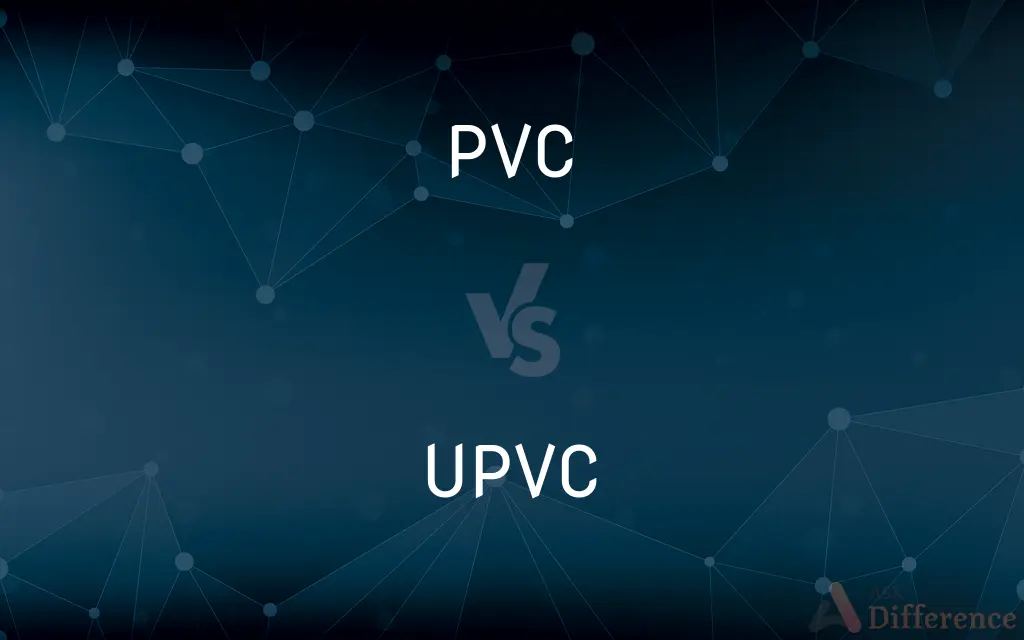PVC vs. UPVC — What's the Difference?
By Tayyaba Rehman — Published on October 10, 2023
PVC Polyvinyl chloride, a synthetic polymer used in various applications, including pipes, cables, and clothing. UPVC Unplasticized polyvinyl chloride, a rigid form of PVC known for its durability, often used in construction for windows and doors.

Difference Between PVC and UPVC
Table of Contents
ADVERTISEMENT
Key Differences
PVC, or polyvinyl chloride, is a versatile synthetic polymer known for its flexibility and wide range of applications.
UPVC, or unplasticized polyvinyl chloride, is a specific form of PVC that has undergone a process to remove plasticizers, making it rigid and durable.
PVC is a type of plastic that can be found in everyday products such as pipes, electrical cables, clothing, and inflatable structures. UPVC is commonly used in the construction industry for windows, doors, and other building components. It is favored for its strength, thermal insulation properties, and resistance to weathering.
PVC is valued for its durability, chemical resistance, and low cost. However, it has a flexible nature due to plasticizers, which can make it unsuitable for certain construction uses, especially when rigidity is required. Unlike PVC, UPVC maintains its shape and rigidity over time, making it ideal for structural applications where stability is crucial.
Comparison Chart
Nature
Flexible
Rigid
ADVERTISEMENT
Common Uses
Pipes, cables, clothing
Windows, doors, building components
Plasticizers
Contains plasticizers
Plasticizers removed
Rigidity
Less rigid, flexible
Highly rigid, stable
Construction Applications
Limited due to flexibility
Widely used for structural elements
Compare with Definitions
PVC
A versatile plastic used in pipes and clothing.
PVC pipes are commonly used in plumbing.
UPVC
Rigid, durable PVC used in construction.
UPVC windows offer excellent insulation.
PVC
A polymer with plasticizers for flexibility.
Raincoats are often made from PVC material.
UPVC
PVC with plasticizers removed for stability.
The UPVC door remained sturdy even in harsh weather.
PVC
A synthetic material used in inflatable structures.
Inflatable pool toys are typically made of PVC.
UPVC
A strong, weather-resistant building material.
UPVC is a preferred choice for exterior cladding.
PVC
A low-cost plastic used in various consumer products.
PVC is a common material in household items.
UPVC
A rigid form of polyvinyl chloride.
UPVC profiles ensure the durability of window frames.
PVC
A plastic known for its chemical resistance.
Electrical cables often have PVC insulation.
UPVC
PVC with enhanced structural properties.
UPVC pipes are known for their longevity.
PVC
A polymer of vinyl chloride used instead of rubber in electric cables
PVC
Irregularity of cardiac rhythm; recurrent occurrences can be a precursor of ventricular fibrillation
Common Curiosities
Where is PVC commonly used?
PVC is found in products like pipes, electrical cables, clothing, and inflatable structures.
Is PVC recyclable?
Yes, PVC can be recycled to reduce environmental impact.
What are the advantages of PVC?
PVC is valued for its durability, chemical resistance, and cost-effectiveness.
What distinguishes UPVC from PVC?
UPVC has had plasticizers removed, making it highly rigid and stable.
Is UPVC a sustainable building material?
Yes, UPVC is often chosen for its durability and long lifespan, reducing the need for replacements.
What is PVC?
PVC stands for polyvinyl chloride, a synthetic polymer used in various applications.
Are there any drawbacks to PVC?
PVC can be flexible due to plasticizers, limiting its use in certain construction applications.
What is UPVC?
UPVC stands for unplasticized polyvinyl chloride, a rigid form of PVC.
Where is UPVC commonly used in construction?
UPVC is widely used for windows, doors, and structural building components.
What are the benefits of UPVC in construction?
UPVC offers strength, thermal insulation, and resistance to weathering.
Share Your Discovery

Previous Comparison
Career Planning vs. Succession Planning
Next Comparison
Marginal Cost vs. Average CostAuthor Spotlight
Written by
Tayyaba RehmanTayyaba Rehman is a distinguished writer, currently serving as a primary contributor to askdifference.com. As a researcher in semantics and etymology, Tayyaba's passion for the complexity of languages and their distinctions has found a perfect home on the platform. Tayyaba delves into the intricacies of language, distinguishing between commonly confused words and phrases, thereby providing clarity for readers worldwide.












































